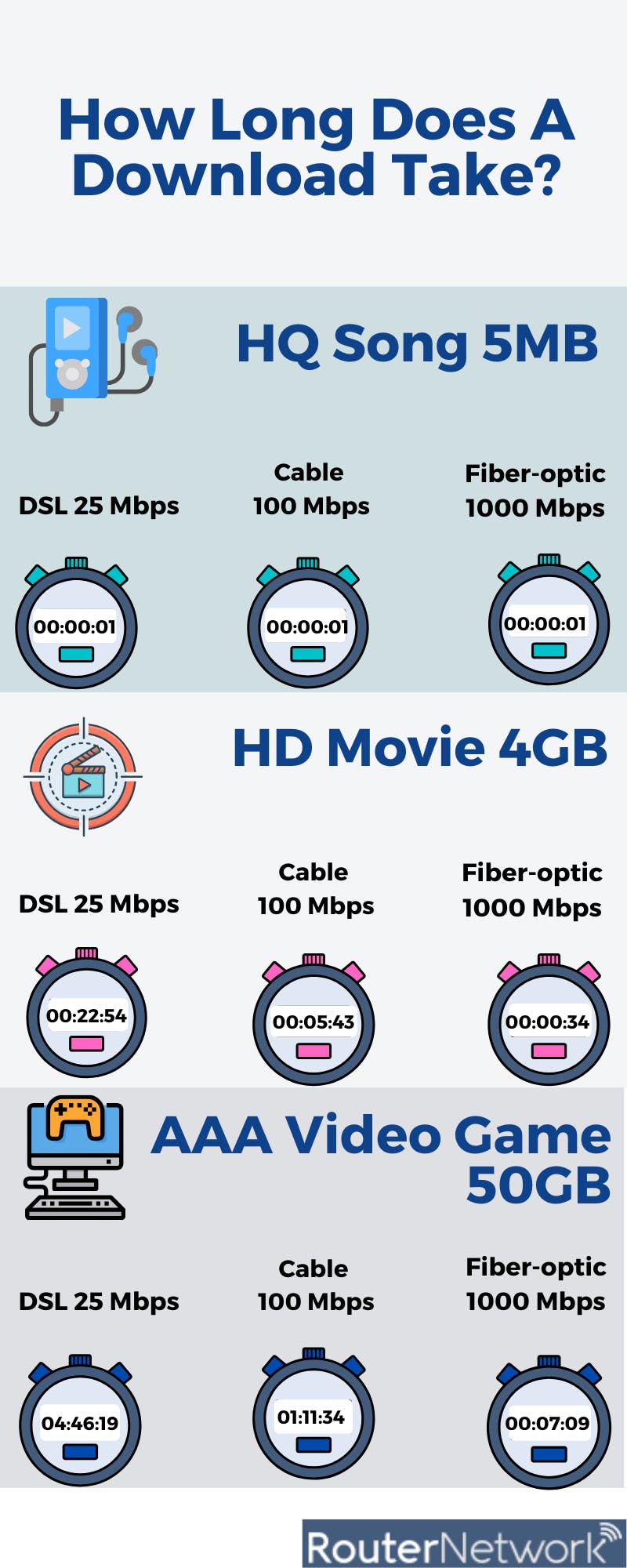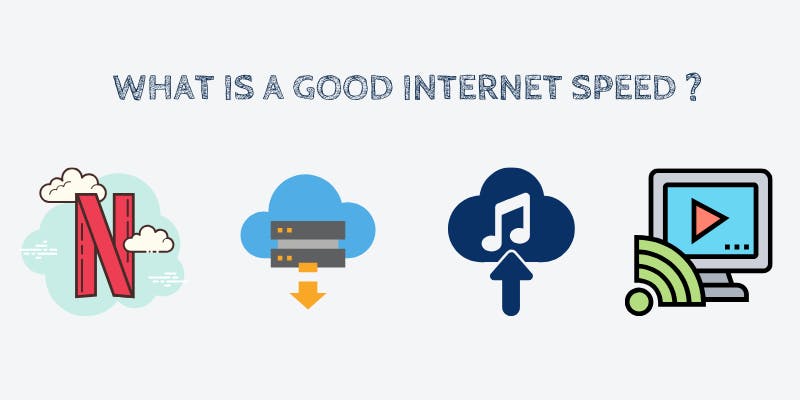What Internet Speed Do I Need?
When comparing internet plans, it is helpful to understand what internet speeds are required for the activities that you will be engaging in and how internet speed is measured.
How is internet speed measured?
To understand how internet speed is measured, let's first take a look at how digital data works. You probably know that everything on your computer is represented by a collection of 1s and 0s. Each 1 or 0 is called a bit. Internet speed is measured by the number of bits per second that it can transfer. There is usually a different number for download speed (when your computer pulls data from the internet) and upload speed (when your computer sends data to the internet).
It's important to note here that we don't generally measure file sizes in bits. We instead measure them in bytes. A byte is 8 bits. When you are simply comparing two different internet services, this information isn't particularly relevant. It does become relevant if you are trying to estimate how much time a given download will take. We'll take a deeper look at this in a later section.
What is 'Broadband'?
You know that broadband refers to fast internet, but what exactly does the word mean? The FCC defines broadband as a service that has a download speed that is at least 25 million bits per second (25Mbps) and an upload speed of at least 3 Mbps. Although newer technologies are increasing the amount of data we need to push through the internet and most services have options so that slower internet connections can still enjoy their service, broadband serves as a nice starting point for what is fast enough versus what is too slow.
What types of internet service are there?
A big limiting factor in the speed that will be available to you is the type of internet service that is available in your area. The list below does not include mobile broadband and focuses on services that are meant for fixed residential or business use. They are listed in order from slowest to fastest.

- Dial-up - This is the slowest form of internet, and isn't used very much anymore. It works over regular phone lines and is limited to a maximum of 56,000 bits per second (Kbps).
- Satellite - Internet delivered via satellite dish is available in most parts of the country and has largely replaced dial-up for rural customers that cannot get service any other way. Modern satellite internet speeds are up to 25 Mbs, putting them right at the limit of the broadband category. Because of the limited bandwidth of satellites, speeds are often slowed if you go over a relatively small amount of data, similar to how data plans on cell phones work. This is true even on unlimited plans, which makes satellite internet less preferable to anything be dial-up.
- DSL - Digital Subscriber Line (DSL) internet is also delivered via phone lines, although it is not available everywhere because it requires newer lines than what dial-up runs on. Speeds on DSL hit a maximum of around 15 Mbps. This makes it slower in theory than satellite, but DSL plans will have much higher limits before your speed is suppressed, making them the preferred option between the two.
- Cable - While DSL technology has remained relatively static, cable internet technology has continued to improve. Once on par with DSL, cable now offers significantly faster speeds. It isn't unusual for cable internet plans to reach as high as 100 Mbps. This is currently the most common type of internet service.
- Fiber-optic - High-speed fiber optic cables are quickly gaining traction across the country, but are available in the fewest places of all the different internet types. These blazing fast connections can reach up to 940 Mbps, making them very close to gigabit speeds.
What is a good Internet speed?
A good speed depends largely on what you plan on using it for. If all you plan on doing is streaming high-quality music and browsing the web, then 1-2 Mbps will be plenty fast for your needs. Most people now use the internet for streaming video though. That increases the requirements a bit. Plan on around 3 Mbps for standard video, 5 Mbps for HD video, and broadband quality (25 Mbps) for 4K video.
Keep in mind though that these are single-use numbers. Ten people all streaming HD videos are going to need a much larger plan than 5 Mbps. Let's take a look at what is best for multi-user scenarios.
What is a good speed for household use?
The speed that you'll need for household use depends on how many people are in your household and how well you manage your usage. The broadband minimum of 25 Mbps will be enough for a family of four to all be watching a different HD video at the same time assuming your speeds are at their maximum. Cable internet can drastically slow down during peak hours when the whole neighborhood is using a lot of bandwidth. Satellite internet will also be very slow during those hours if you've exceeded the tiny allotment of priority data they give you each month. The problems are less severe on DSL or fiber-optic connections.
What is a good speed for business use?
Similar to household use, the ideal business internet speed depends on the total number of users and the way in which the internet will be used. If you have a media company that requires a lot of online video streaming or uploading, then you'll certainly want to go for the highest speeds possible. A typical office setting isn't going to have large numbers of employees all streaming video when they should be working, so you can get by with less. Still, the minimum broadband spec of 25 Mbps will likely get a bit slow when a business with a medium-sized staff is sharing all of the bandwidth. Unless you have a very small business, you'll want speeds of at least 50 Mbps or more to handle the load.
How to take an internet speed test
There are a number of websites on the internet that will allow you to test your internet connection. These sites will tell you your download and upload speeds as well as your ping time. Ping time is the amount of time it takes for your request to reach the server and the server to reply to you. One popular site for testing your speeds is www.speedtest.net. As mentioned previously, your speeds may vary during peak hours so be sure to check it at several different points in the day to get a more complete picture of your internet connection.
How much of a difference does speed make?
We've shown you the types of speeds you'll need for streaming video, but we haven't talked about downloading content yet. As long as you can stream video faster than is needed to play it, then faster speeds aren't much benefit unless someone else is also streaming. Downloads are different, faster speeds will always result in faster downloads. Let's take a look at three common downloads and see how long a few of the services mentioned will take to complete it.

High-quality song download - 5mb
- 25 Mbps broadband minimum: 1 second
- 100 Mbps cable internet: < 1 second
- 1000 Mbps fiber-optic: < 1 second
HD movie download - 4gb
- 25 Mbps broadband minimum: 22 minutes and 54 seconds
- 100 Mbps cable internet: 5 minutes and 43 seconds
- 1000 Mbps fiber-optic: 34 seconds
AAA video game - 50gb
- 25 Mbps broadband minimum: 4 hours, 46 minutes, and 19 seconds
- 100 Mbps cable internet: 1 hour, 11 minutes, and 34 seconds
- 1000 Mbps fiber-optic: 7 minutes and 9 seconds
What factors affect speed?
We have already discussed how having too many things downloading or streaming at once can reduce your speeds because everything that is downloading is taking its own share of the total available bandwidth. We've also discussed how certain internet services can become slow during peak hours. If you are experiencing slow speeds and do not believe one of these issues is the problem, then we invite you to check out our blog post on how to speed up a Wi-Fi signal.
In addition to that article, we have tons of other great resources on this site that will help you to maximize your network performance and make the most of your time at the computer. If you would like us to cover something that we haven't already, please feel free to contact us and drop a suggestion!
